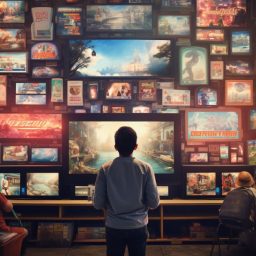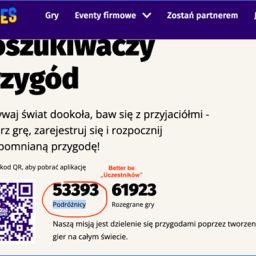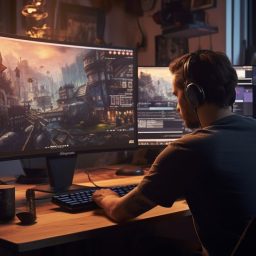

Developing a great game itself can never make it a global hit by default. A lot depends on the video game content resonating well with the gamers, wherever they are in the world, and that means high quality game localization is unavoidable.
What is the video game localization process, and why is it so important in the global video game industry? These are some of the questions we are answering today, including examples of some of the most successful and intriguing localized games that have been developed in recent history.
Contents
What is video game localization?
Why is the process of adapting video games to a new audience known as “game localization” rather than “game translation”? It is because translation only forms a part of the localization process. This process goes beyond the translation of the text and dialogues, as the localized game also adopts a number of in-game elements, including imagery and cultural elements, which have an impact on how the game is received by the players interacting with it in their chosen target language and culture.
The goal of the video game localization process is to maintain the same experience for all the players, no matter what language is targeted by the game developers. The exact ins and outs of any given localization process depend on what kind of game it is, and usually covers the following elements:
- user interface, statistics, names of locations and items
- in-game dialogue and NPC prompts
- quest descriptions and any relation information
- in-game announcements and updates
- player tutorials
- dialogue and cut-scene subtitles
A simple translation process, or simply just a literal translation, has no chance of fitting the game development process since a properly localized game requires a lot more effort.



Why is the localization process so important?
If game localization were not a simple task, would it really be worth the effort? Generally yes, as having a game with localized versions in multiple languages opens up the project to new revenue streams. The benefits do not end there, as localizing games helps you to grow your audience and achieve global success in the gaming industry.
Sometimes local legislation also has to be taken into consideration. An improperly localized version of the game may not be viable to launch in some markets, as the regulations may restrict certain content, such as depictions of blood, gore, consumption of various substances, or even sexual acts.
Video game market – top countries
When choosing the languages to target, you may have to choose some rather than others. After all, there are over 300 languages in the world, and it is not usually possible to deliver all the relevant language versions for each country. Instead, it pays to research to help decide which target markets play the biggest roles in the gaming industry.
The top 10 markets for video games are China, USA, Japan, South Korea, Germany, UK, France, Canada, Spain and Italy. This means that the game designers usually target Chinese, English, Japanese, Korean, German, French, Spanish and Italian. However, it is not always possible to cover them all, which means prioritizing in terms of market size is not always the best solution.
For instance, while English is usually a no-brainer, the Chinese market has imposed many restrictions on games, so it may not be worth releasing it there if the effort required to overcome the restrictions is too difficult. Now Germany has a decent sized gaming market, and it has fewer restrictions in terms of video games, which means the localization process is likely to be less costly. When your localization project budget is limited, then choosing Spanish or French may be a more cost-effective option as not only will those versions be cheaper, there are also substantial communities of native speakers outside of Europe, such as in South America and Africa. These players can better experience your games, even if they do not have a dedicated version.
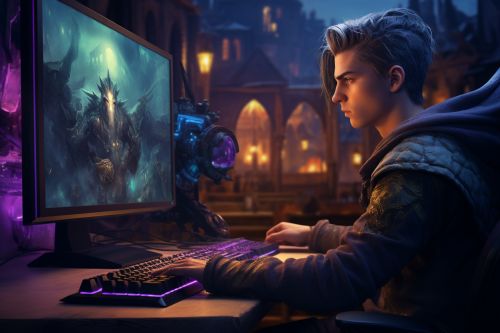


Game localization – some examples
Game localization allows your projects to reach new highs, like many games have in recent years. We can take a moment to explore some examples of video games that have gone above and beyond in their localization efforts. They have achieved game localization in many interesting ways, and demonstrated creative and thoughtful approaches to adapting game content for diverse audiences.
World of Warcraft (WoW)
This is a massive multiplayer online role-playing game (MMORPG) that has undergone extensive localization efforts and at some point in time may have been the biggest game in the world. Not only is the game is available in multiple languages, including English, Spanish, French, German, Russian, Chinese, Korean, and more, but the game’s content has been altered in meaningful ways in order to appeal to the Chinese-speaking audiences. The developers from Blizzard worked closely with the local publisher to remove or change any references to skeletons or skulls, and other images connected with bad luck in China.
Each localized version of WoW aims to provide a seamless experience for the players in their respective regions, which means much more than just the translated text as it also includes culturally adapted content. The game’s extensive lore and quests required careful adaptation to ensure that the narrative remained engaging across many different linguistic and cultural contexts.
Persona 5
Persona 5 is set in Tokyo, has a strong Japanese cultural backdrop, and it underwent a meticulous localization process to make the game relatable to Western players. The English localization team faced the challenge of retaining the game’s Japanese identity while making it accessible and culturally relevant. They navigated the language intricacies, adapted societal references, and ensured that the story’s Japanese context was effectively conveyed. This localization effort contributed to the game’s success in resonating with a global audience while preserving its distinct Japanese flavour.
Minecraft
Minecraft, known for its open-world sandbox gameplay, has been extended into over 120 languages, making it one of the most widely accessible games worldwide. The localization efforts go beyond the textual elements to include in-game items, interfaces, and even tutorial content. Mojang, the game developer, has demonstrated a commitment to inclusivity by continuously expanding the list of supported languages. This approach has contributed to the popularity of Minecraft across diverse regions and player communities, fostering a sense of inclusiveness and accessibility.
Witcher 3: Wild Hunt
Witcher 3: Wild Hunt, an acclaimed action role-playing game, is a great example of localization that has faced the challenge of maintaining the depth and richness of its narrative in various languages. The developers went as far as to deliver voice-acting in 9 separate languages. Each language version was based on the original Polish text and underwent a meticulous localization process to ensure that the intricate storytelling, character development, and cultural elements were all faithfully represented. The translation and localization team worked closely with the developers to capture the essence of the game’s dark fantasy world, providing an immersive experience for players from different linguistic regions. This approach contributed to the game’s critical acclaim and success in captivating a global audience.
The Legend of Zelda: Breath of the Wild
The Legend of Zelda series, known for its rich narratives and cultural elements, faced the challenge of making Japanese cultural references accessible to a global audience. In the English localization, the team took a careful approach to adapt these cultural aspects without losing the essence of the game. For instance, traditional Japanese customs and idioms were transformed into concepts more familiar to Western players, maintaining the thematic integrity while ensuring broader understanding. This careful adaptation allowed players worldwide to engage with the game’s narrative without feeling disconnected from its cultural roots.
Undertale
As an indie title known for its innovative approach to storytelling, it features characters that have unique speech patterns. The localization team went beyond literal translations, preserving these distinctive speech patterns in the target languages. This involved some creative adaptation to maintain the character’s personality and quirks. The decision to retain these linguistic elements, such as specific speech styles or word choices, added depth to the characters and contributed to the game’s charm. Undertale‘s localization exemplifies how thoughtful adaptation can enhance the player’s connection to the characters and narrative across different languages.

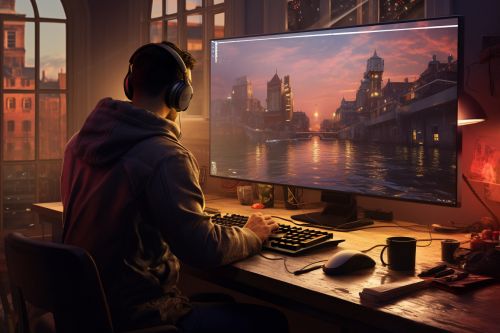

Translate your video game
Like all aspects of game localization, it can vary in quality. Poor localization, insufficient context and translation errors can even turn off the target audience and destroy sales in a specific region. Dedicating significant resources and having relevant localization experts in a development team is not within the budget for all game studios. Instead, it may be easier to outsource the game translation to a team of experienced translators.
They can assist you in creating a localization strategy and localization kit, help you through the translation quality assurance phase of the games developed and deliver a final version of your original game. As experts in all manner of translations, our translation team at Skrivanek can handle your localization project, to ensure that your new game resonates with players in different locations across the globe, no matter whether it is in your own language or that of any other target culture.
Images generated by AI.


